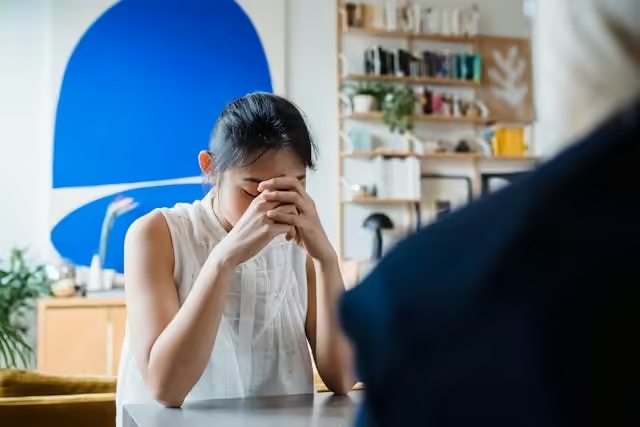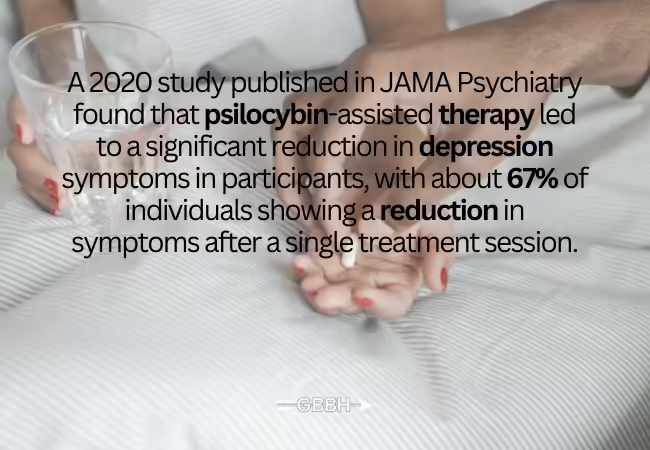Mental health issues, particularly major depressive disorder (MDD), are a major public health concern affecting millions of people globally. Traditional treatment methods, such as psychotherapy and antidepressant medications, are effective for many but not enough for everyone. As research into alternative therapies continues to progress, psilocybin, a naturally occurring psychedelic compound, has emerged as a promising treatment for those suffering from MDD. At Greater Boston Behavioral Health, we are dedicated to exploring the latest advancements in mental health care, ensuring our patients have access to evidence-based treatments that best support their needs.
What Is Psilocybin?
Psilocybin is the active compound found in certain species of psychedelic mushrooms, sometimes referred to as “magic mushrooms.” It has been used for centuries in cultural and spiritual practices due to its psychoactive properties, but in recent years, psilocybin has drawn attention from researchers for its potential therapeutic effects. Unlike other traditional treatments for depression, psilocybin offers a unique approach by altering brain function in a way that promotes emotional healing and cognitive flexibility.
The Connection Between Psilocybin and Major Depressive Disorder
Recent studies have shown promising results for the use of psilocybin in treating MDD. Research conducted at renowned institutions, such as Johns Hopkins University and Imperial College London, has demonstrated that controlled, supervised use of psilocybin, combined with psychotherapy, can lead to significant improvements in depression symptoms. In clinical trials, participants have reported a reduction in depressive thoughts, an increased sense of well-being, and an enhanced ability to process and manage emotions.
Psilocybin works primarily by interacting with serotonin receptors in the brain, which play a critical role in mood regulation and perception. When consumed, it alters the brain’s activity, promoting increased communication between different areas of the brain. This enhanced connectivity can lead to a shift in consciousness, allowing patients to gain new perspectives on their thoughts and emotions. This shift can help individuals break free from deeply ingrained negative thought patterns that fuel depression.
How Psilocybin Compares to Conventional Depression Treatments
Traditional treatments for MDD include cognitive-behavioral therapy (CBT) and antidepressant medications. While these methods can be highly effective for many, they don’t always work for everyone. The effectiveness of CBT lies in its structured approach, which helps individuals identify and challenge negative thought patterns, ultimately changing behaviors. However, CBT often requires significant time and repeated sessions before symptoms improve. Similarly, while antidepressant medications can alleviate some symptoms of depression, they often come with side effects and may not provide relief for all patients.
Psilocybin-assisted therapy offers a new paradigm in treatment. By inducing an altered state of consciousness, psilocybin allows individuals to experience profound shifts in their thinking and emotional regulation. When combined with psychotherapy, psilocybin can facilitate breakthrough moments, enabling patients to confront and process traumatic memories and emotions that may be holding them back. While this treatment is still under investigation and not widely available, preliminary findings suggest it could be particularly beneficial for those who have not responded well to conventional therapies.
How Psilocybin-Assisted Therapy Works
Psilocybin-assisted therapy is a therapeutic approach that combines the use of psilocybin—a naturally occurring psychedelic compound found in certain mushrooms—with structured psychotherapy. This treatment typically begins with a preparation phase, where patients meet with trained therapists to discuss their goals, set intentions, and establish trust. During the therapy session, patients consume a controlled dose of psilocybin in a safe and supportive environment, guided by experienced therapists. The substance promotes altered states of consciousness, enabling patients to explore and process their emotions and thought patterns. The integration phase follows, where therapists help patients make sense of their experience, identify insights, and integrate these lessons into their daily lives.
This approach has been shown to promote neuroplasticity, which can help individuals reframe negative thought patterns and build resilience. The treatment is often paired with a combination of therapies such as Cognitive-Behavioral Therapy (CBT) or Dialectical Behavior Therapy (DBT), making it a comprehensive part of a Mental Health Treatment Program.
Comparing Psilocybin to Traditional Treatment
When compared to traditional treatments for major depressive disorder (MDD) such as antidepressant medications and talk therapy, psilocybin therapy offers a unique advantage due to its potential to facilitate rapid and profound shifts in perception and mood. Antidepressants typically take weeks to start showing effects and work by altering serotonin levels over time. In contrast, psilocybin impacts the brain’s serotonin receptors, potentially fostering an immediate and deep sense of emotional release and insight.
Traditional therapies like CBT or DBT focus on teaching coping mechanisms and helping individuals reframe their negative thinking patterns, which can take longer to yield significant results. Psilocybin-assisted therapy, on the other hand, can accelerate this process by promoting a state of heightened introspection and emotional processing that may lead to lasting changes in how patients respond to stressors and emotional challenges.
Benefits and Potential Risks of Psilocybin Therapy
Benefits:
- Rapid Relief: Clinical trials have demonstrated that patients often experience relief from depressive symptoms within a few days of a single psilocybin session.
- Enhanced Emotional Processing: The psychedelic experience can lead to breakthroughs in emotional processing, offering new perspectives on personal struggles.
- Increased Neuroplasticity: Psilocybin encourages the formation of new neural connections, which can help individuals overcome rigid patterns of thought associated with depression.
Potential Risks:
- Psychological Discomfort: The intense experience can trigger anxiety, confusion, or even fear during the session, especially if not properly managed by experienced therapists.
- Not Suitable for Everyone: Individuals with certain mental health conditions, such as schizophrenia or psychosis, may not be candidates for psilocybin therapy due to the risk of exacerbating symptoms.
- Lack of Regulation: While research is growing, psilocybin-assisted therapy is still not widely available and is regulated differently in various regions.
Safety and Challenges of Psilocybin Therapy
While the benefits of psilocybin-assisted therapy are promising, it’s important to recognize that it is still an experimental treatment. Psilocybin is not currently approved by the FDA for clinical use outside of research settings, and more studies are necessary to understand its long-term effects and safety profile.
Benefits of psilocybin therapy include:
- Reduced depressive symptoms: Studies indicate significant reductions in depression severity.
- Improved emotional processing: The experience can enable patients to confront and process difficult emotions.
- Increased neuroplasticity: Psilocybin can promote brain adaptability, potentially leading to long-lasting changes in behavior.
Challenges and risks to consider include:
- Potential psychological distress: The intense nature of the experience can lead to anxiety or paranoia if not managed properly.
- Legal and regulatory barriers: Psilocybin remains a controlled substance, limiting accessibility.
- Need for professional guidance: Therapy should be conducted in a controlled, supportive environment with trained facilitators.
Who Is a Candidate for Psilocybin Therapy?
Psilocybin therapy is generally considered for individuals who have not found sufficient relief from traditional treatments for depression or anxiety. Ideal candidates are those who are motivated to engage in deep self-exploration and are prepared for the potential psychological intensity of the experience. Psilocybin therapy might also be beneficial for individuals who:
- Have chronic or treatment-resistant depression.
- Are dealing with severe anxiety or PTSD.
- Seek an alternative to conventional medications.
However, individuals with a history of psychosis or other severe mental health conditions that could be triggered by psychedelic experiences should consult with mental health professionals to determine whether psilocybin therapy is appropriate.
Legal and Ethical Considerations
The legal status of psilocybin varies widely. In many areas, psilocybin remains classified as a Schedule I substance, making it illegal to possess or administer. However, recent shifts in public opinion and legislative efforts have led to decriminalization movements and clinical trials, with some cities and states making strides toward legal, supervised use of psilocybin for therapy.
Ethically, psilocybin therapy must be conducted with strict protocols to ensure patient safety and informed consent. Patients should be fully briefed on potential risks and benefits and should receive support from licensed therapists trained in psychedelic-assisted therapies. Additionally, therapists must create a safe, controlled environment that allows for a therapeutic and supportive experience, with careful follow-up to help integrate the insights gained into daily life.
Integrating Psilocybin Therapy with Traditional Treatment Options
At Greater Boston Behavioral Health, we understand the value of a comprehensive approach to mental health treatment. While psilocybin therapy holds potential, it is most effective when integrated with traditional treatment programs, including dialectical behavior therapy (DBT) and cognitive-behavioral therapy (CBT).
DBT, which is particularly effective for individuals struggling with emotional regulation and self-destructive behaviors, can be combined with psilocybin therapy to help patients manage their emotions before, during, and after treatment. This integration ensures that patients have the tools they need to process their experiences in a safe and controlled manner.
Intensive outpatient programs (IOP) and partial hospitalization programs (PHP) can also play an essential role in supporting individuals who are exploring new treatment methods. By participating in structured therapy sessions alongside psilocybin therapy, patients can gain deeper insights and have access to continued support from experienced clinicians.
Why Seek Treatment at Greater Boston Behavioral Health?
At our Mental Health Treatment Center in Massachusetts, we pride ourselves on providing a variety of Mental Health Therapy Programs that cater to the diverse needs of our community. Our dedicated team utilizes evidence-based practices such as CBT, DBT, and comprehensive depression treatment programs to ensure that every patient receives the care they need. For those who are interested in exploring innovative therapies and treatment combinations, we guide our patients through their options and provide the highest standard of care.
Whether you’re seeking support for depression, anxiety, or other mental health concerns, our team at Greater Boston Behavioral Health is committed to partnering with you for your well-being and recovery. Our goal is to create an individualized plan that leverages both conventional and emerging treatment methods, empowering our patients to live healthier, more fulfilling lives.
Conclusion
The evolving field of mental health treatment is opening doors to new possibilities for managing major depressive disorder. Psilocybin-assisted therapy holds potential for individuals who have not found relief through traditional methods, providing a transformative approach that could complement existing treatment plans. However, it’s crucial that this therapy be approached with care and administered under professional supervision. For those considering various mental health treatment options, Greater Boston Behavioral Health is here to help guide you through the process, ensuring that you receive comprehensive, compassionate care tailored to your needs. Call us at (888)278-0716 today to learn more about our services and how we can help you on your journey to recovery!
FAQs on Psilocybin Therapy for Depression
How does psilocybin therapy work for depression?
Psilocybin impacts the brain’s serotonin receptors, promoting neuroplasticity and enabling patients to reframe negative thinking patterns. This can lead to rapid and significant improvements in mood and emotional processing, which can be beneficial for those suffering from treatment-resistant depression.
What are the potential benefits of psilocybin-assisted therapy?
Potential benefits include rapid relief from depressive symptoms, enhanced emotional processing, increased neuroplasticity, and new perspectives on personal struggles.
Are there risks associated with psilocybin therapy?
Yes, potential risks include psychological discomfort, anxiety, and confusion during the experience. It may not be suitable for individuals with certain mental health conditions like schizophrenia.
Who is a good candidate for psilocybin therapy?
Individuals who have not found relief from traditional depression treatments and are open to deep self-exploration may be good candidates. However, it’s important to consult with a qualified mental health professional to assess suitability.
Is psilocybin-assisted therapy legal?
The legality of psilocybin varies by region. While still classified as a Schedule I substance in many areas, certain cities and states are moving toward decriminalization and regulation for therapeutic use. Always consult local laws and licensed treatment centers for guidance.


